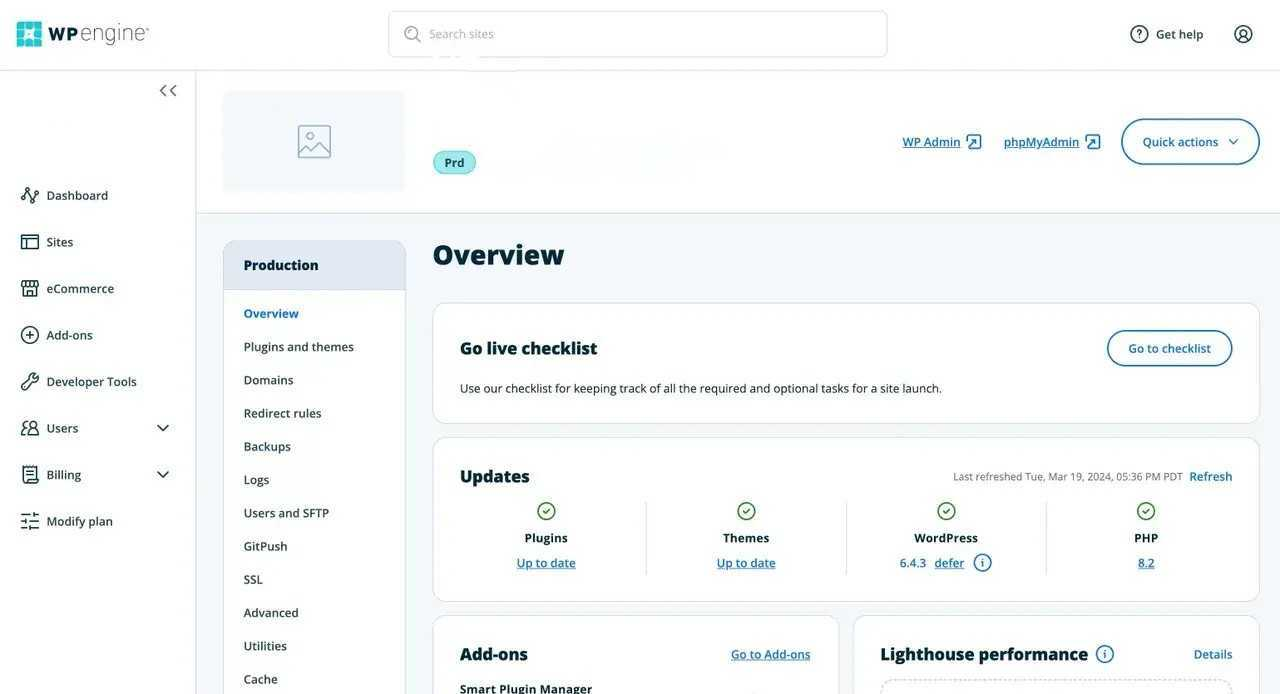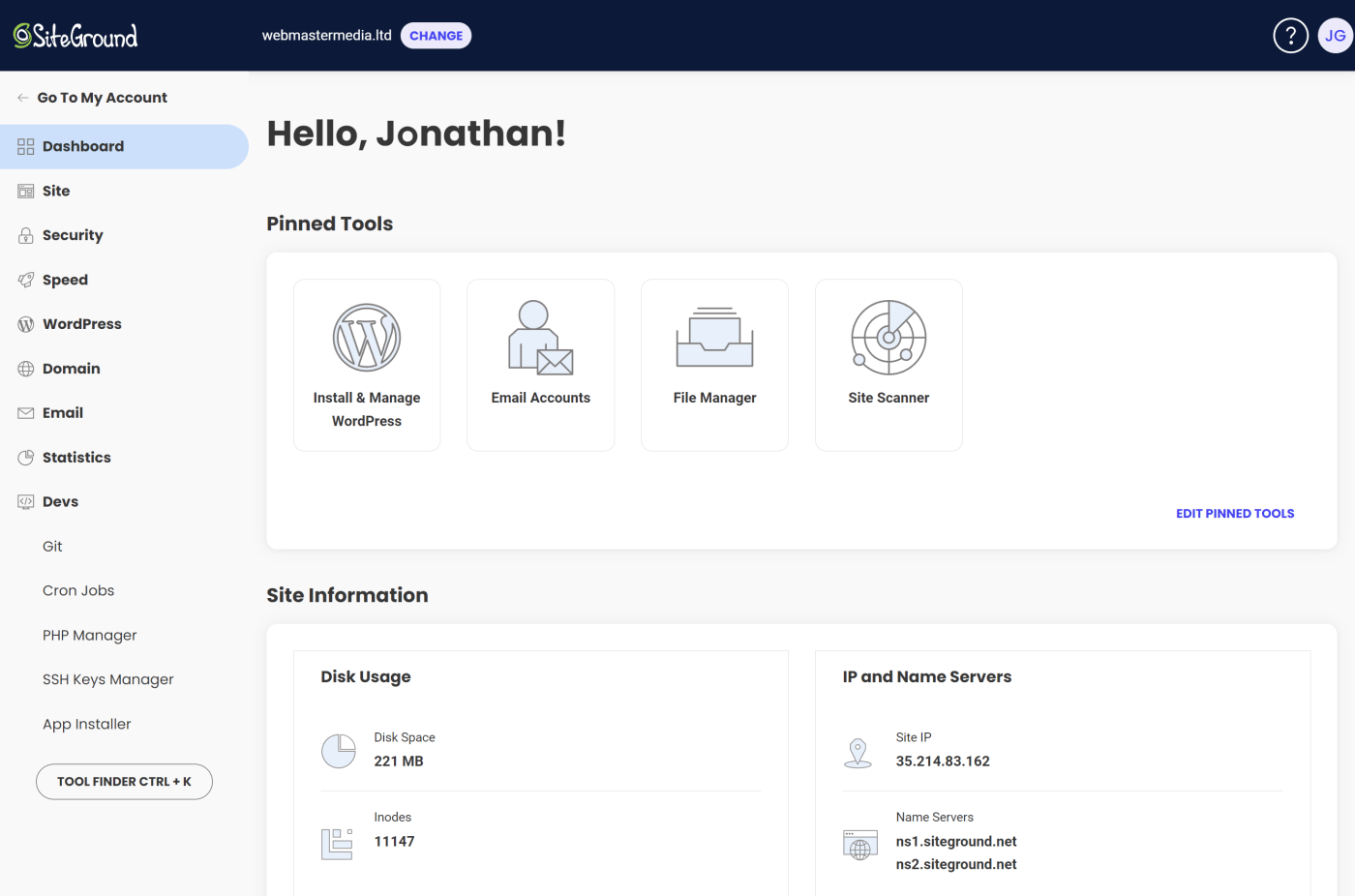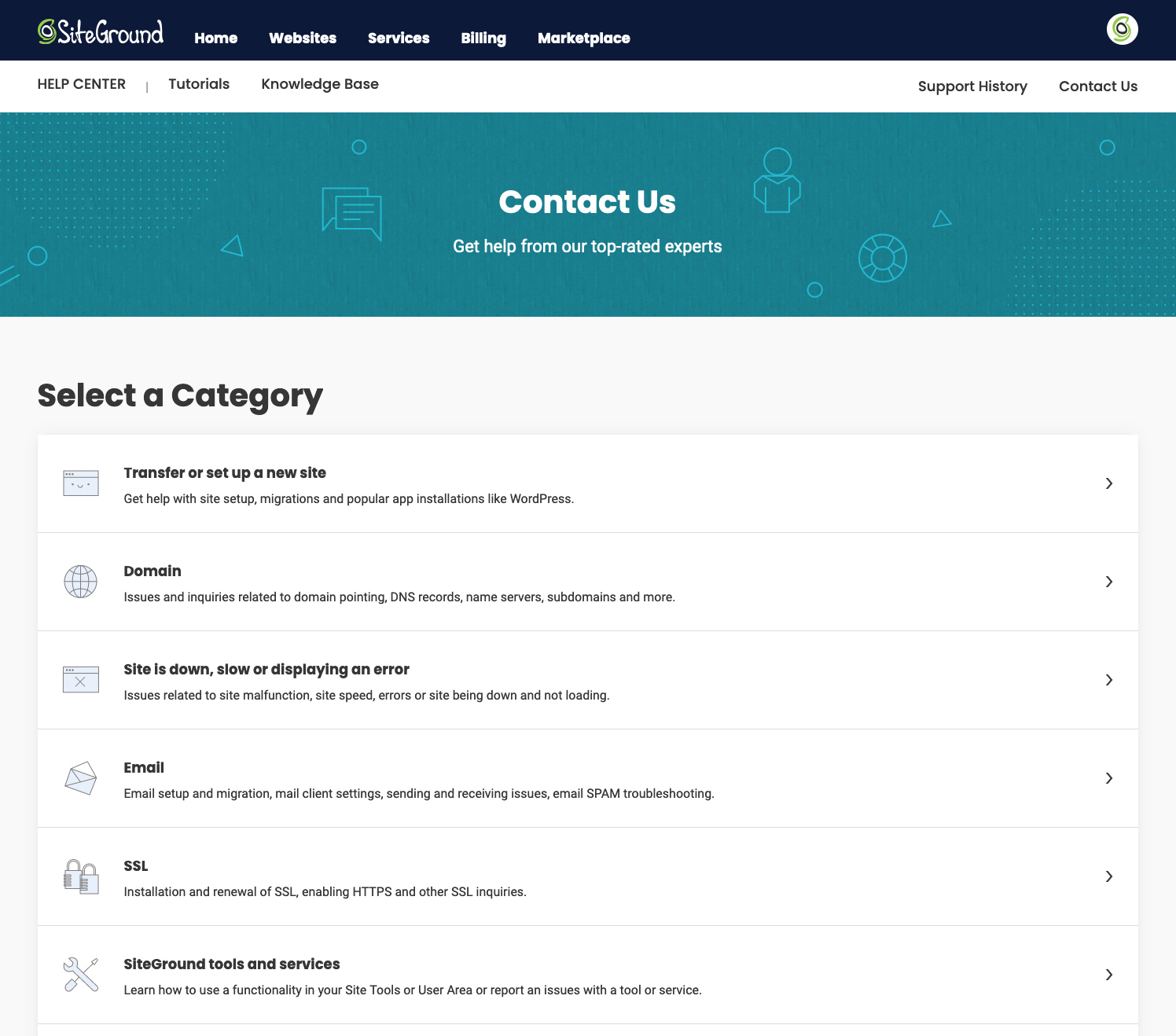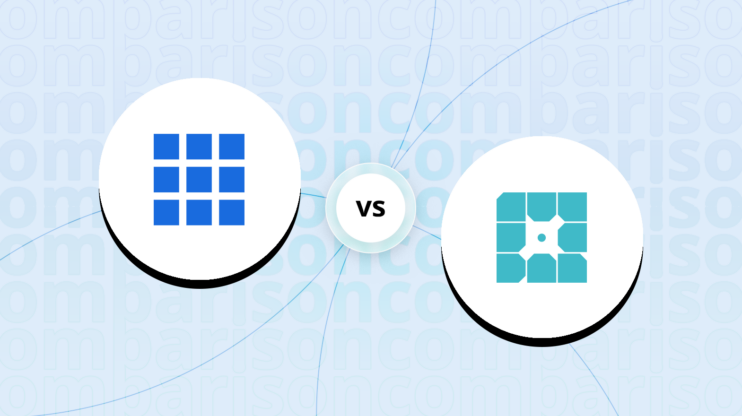Siteground vs WP Engine: Final verdict
Comparing SiteGround and WP Engine, both hosting providers excel in delivering strong, user-focused services, although they cater to somewhat different audiences.
-
SiteGround (Overall grade: 8.8)
offers a versatile range of plans that stand out for their affordability, rich feature set, and excellent customer support. Strengths include comprehensive security measures, free daily backups, and strong email hosting options. However, its shared and cloud hosting services do not provide the same level of enterprise-grade performance and specialized WordPress tools as WP Engine. The intuitive user interface and competitive pricing make it particularly attractive to beginners and small-to-medium-sized businesses.
-
WP Engine (Overall grade: 8.6)
shines in its specialized managed WordPress hosting, ensuring top-tier performance and security with features like EverCache® technology and extensive compliance certifications. Best suited for agencies and high-traffic websites, it offers robust tools for developers and excellent uptime guarantees. While it delivers superior speed and security, the higher pricing and lack of a free website builder or email hosting could deter small businesses or users with limited budgets. Nonetheless, WP Engine remains a favored choice for businesses needing reliable, high-performance WordPress hosting backed by premium support.
 Overall grade:8.8 |
 Overall grade:8.6 |
|
|---|---|---|
| Uptime and Availability | 9.4 | 9.6 |
| Hosting Performance | 8.8 | 9.1 |
| Hosting Security | 8.6 | 9.4 |
| Price | 8.4 | 8.1 |
| Hosting Features | 8.5 | 6.8 |
| Ease Of Setup | 8.9 | 8.3 |
| User Management | 8.4 | 8.8 |
| Customer Support | 9.2 | 8.9 |
| User feedback | 4.3/5 | 4.6/5 |
Hosting types offered
Both platforms provide a variety of hosting types, each designed to meet the different needs of users.
 |
 |
|
|---|---|---|
| Shared hosting | ||
| Cloud hosting | ||
| WordPress hosting | ||
| Ecommerce hosting | ||
| VPS hosting | ||
| Dedicated hosting |
Although both offer a variety of hosting plans tailored to different needs, in
certain cases, one platform may prove to be more suitable.
Detailed comparison
Uptime and availability
Evaluates the average uptime statistics, uptime guarantee and overall availability of the hosting
provider
Score Components:
- Uptime percentage (30%): evaluates the uptime statistics in given period of time
- Uptime guarantee (20%): Assesses if the platform offers an uptime guarantee and
whether the actual uptime matches the promised guarantee. - General performance (25%): Evaluates how fast is the average response time and overall
it’s stability. - Responsiveness (10%): Adaptability to different devices and screen sizes.
- Availability (25%): Reflects the total downtime and number of outages.
 9.4
9.4
 9.6
9.6
🏆 Winner WP Engine: Known for superior uptime and consistent high performance.

WP Engine boasts a 99.99% Service Level Agreement (SLA), ensuring reliable site availability. The platform’s server response time averages 489ms and has a difference of just 49ms between the maximum and minimum response times. With 24/7 uptime monitoring and proactive security measures, WP Engine ensures your website remains accessible globally.

SiteGround also delivers strong uptime with a 99.9% guarantee and excellent server response times at 0.207 seconds. Over a two-month observation, it achieved an actual uptime of 99.99%. With multiple server locations and robust support options, SiteGround is a dependable contender. Compensation options further underscore their commitment to reliability.
Which one has better hosting performance?
Score Components:
- Hosting speed (30%): This includes SSD quality, Load times, PageSpeed score ranges,
additional information on website speed, built-in plugins for performance enhancement, available caching
methods, and CPU/RAM options - CDN (20%): Considers whether CDN is available or not, whether it’s free or paid, and
the quality of the CDN service - Available data centers (30%): Evaluates the number of data centers and their locations
globally. - Scalibility (20%): Looks at whether elastic scaling is available, the process required
to scale (manual upgrade vs. automatic scaling), the presence of dedicated servers, and the costs
associated with scaling.
 8.8
8.8
 9.1
9.1
🏆 Winner
WP Engine: For users who prioritize speed and advanced technological infrastructure, WP Engine is more suitable for high-demand websites that require reliable and fast global access.
WP Engine and SiteGround both offer SSD storage and free CDN integration to enhance hosting performance and speed. WP Engine, however, showcases faster load times with a heavyweight theme clocked at 1.69 seconds, compared to SiteGround’s 4.85 seconds. WP Engine operates 11 global data centers, which surpasses SiteGround’s six, potentially offering better local loading speeds and content delivery. Moreover, WP Engine’s technology is more up-to-date, which may contribute to its superior performance.
Website speed
SiteGround’s ultrafast server setup with custom implementations of PHP and MySQL cuts the time to first byte (TTFB) and speeds up page loads by an average of 30%. Static and dynamic caching through its SuperCacher service can make sites load up to 5x faster. WP Engine also prioritizes speed with proprietary EverCache® technology and free CDN, which improves page load times and ensures smooth user experiences. Both hosts provide the latest PHP versions, but WP Engine’s integration with Core Web Vitals gives it an edge.
Scalability
WP Engine offers scalable architecture designed to handle traffic spikes effortlessly, thanks to isolated resources that optimize performance and reliability. The cost and specific methods of scaling are not mentioned, so it’s best to check with their support for detailed pricing. SiteGround offers automatic scaling features but does not provide a clear answer on dedicated servers. The cloud plans start at $100.00 per month, making it relatively easy to scale up by upgrading plans.
Which one has better security features?
and regulatory requirements
Score Components:
- Technical security measures (40%): This includes encryption, firewalls, DDoS
protection, secure configurations, server monitoring, access control and availability of security addons
(e.g Sitelock security). - Operational security measures (30%): Encompasses data privacy, backups and data
redundancy. - Compliance and certifications (20%): Adherence to legal and regulatory requirements
(e.g., GDPR, HIPAA) and possession of certifications (e.g., ISO 27001, SOC 2). - Business and reliability (10%): Factors in the provider’s reputation, uptime
guarantees, and customer support.
 8.6
8.6
 9.4
9.4
🏆 Winner WP Engine: Superior security measures and extensive compliance.
Both SiteGround and WP Engine, have notable differences in their approaches to technical and operational security, as well as in their compliance with regulations.
Technical security measures:
SiteGround provides robust security through features like their Smart Web Application Firewall (WAF), AI anti-bot system, and distributed backups. They also offer automatic WordPress and WooCommerce updates to safeguard against vulnerabilities. WP Engine employs global edge security with a managed WAF, DDoS mitigation, and Cloudflare CDN. Their enterprise-grade technology automates threat detection and blocks 72 million attacks daily. While both offer comprehensive security, WP Engine’s technology for real-time threat detection and extensive protective measures make it more advanced.
Operational security measures:
SiteGround ensures system reliability with 24/7 system administration and daily backups, which are key for operational security. Their multi-layered security from Google’s data centers adds another layer of protection. WP Engine takes operational security further with continuous monitoring, proactive threat detection, and real-time security management. Their platform-level protection, extensive updates, and 24/7 global support enhance operational reliability. The continuous, always-on protection system by WP Engine gives it an edge in operational security.
Compliance and certifications:
SiteGround does not specify compliance with SOC-2 or ISO 27001-2013 standards, primarily focusing on general data protection. On the other hand, WP Engine is SOC-2 compliant and ISO 27001-2013 certified, meeting high standards for security management and availability. While SiteGround offers robust security measures, WP Engine’s certifications for compliance with stringent industry standards place it ahead.
 |
 |
|
|---|---|---|
SSL certificate |
Free via Let’s Encrypt |
Free |
Additional security features |
Daily backups, AI anti-bot system |
DDoS mitigation, WAF |
PHP versions |
Not specified |
Not specified |
GDPR compliance |
Not specified |
Not specified |
HIPAA compliance |
Not specified |
Not specified |
PCI compliance |
Not PCI compliant |
PCI vulnerability scanning |
Hosting features
Score Components:
- Domains (20%): Assesses the availability of a free domain, domain purchase options, and
pricing - Email (15%): Considers if the provider offers full email hosting, or is reselling
third-party service, and if the email is only transactional or not - Website builder (15%): Checks if website builder is available, and it’s user
friendliness and overall the level of customization allowed. - Staging environment (20%): Determines if a staging environment is available, allowing
for testing changes before going live. - FTP & SFTP accounts (10%): Evaluates if and how easily users can access FTP and
SFTP accounts - Git and SSH access (20%): Assess whether Git is integrated into the hosting service and
if SSH access is provided
 8.5
8.5
 6.8
6.8
🏆 Winner SiteGround: Comprehensive features make it ideal for diverse website needs.
SiteGround and WP Engine both offer robust hosting solutions, but they cater to slightly different user bases with distinctive features. SiteGround excels in user-friendliness, providing a free site builder and a wealth of customizable options. This makes it suitable for users who might not be technically inclined but still want to create complex, dynamic websites. The inclusion of free features like WP installation, SSL, daily backups, and email hosting could also be appealing, as it minimizes additional costs and complexities. SiteGround’s clear emphasis on renewable energy and environmental impact may attract eco-conscious users.
WP Engine, on the other hand, targets a more performance-driven audience with its suite of advanced tools. Its standout features like EverCache® technology for site speed, Global CDN, detailed performance insights, and flexible site copy tools demonstrate a focus on optimization and developer needs. While it doesn’t offer a free domain and lacks a built-in site builder, WP Engine compensates with powerful security measures and stellar customer support. It’s ideal for businesses that require high performance, especially those that rely heavily on eCommerce or have mission-critical websites. The tiered pricing accommodates businesses as they scale, though it may be a pricier option from the start.
 |
 |
|
|---|---|---|
Free domain |
No |
No |
Free SSL |
Yes |
Yes |
Email hosting |
Yes |
No |
Website builder |
Yes |
No |
Staging environment |
Yes |
Yes |
FTP & SFTP accounts |
Yes |
Yes |
Git and SSH access |
Yes |
Yes |
Free backup |
Yes |
Yes |
Money back guarantee |
30 Days |
Yes |
a location.
As a result in rare cases the features mentioned here can differ from the ones you see on their websites.
Both providers support a range of users from beginners to experts with user-friendly website builders and WordPress staging areas. However, in terms of developer tools, both SiteGround and WP Engine offer robust options including SSH access, support for multiple programming languages, and Git for version control, thus appealing to developers looking for advanced capabilities.
Email services:
SiteGround offers comprehensive email hosting, allowing users to set up professional email accounts linked to their domain. This feature is particularly beneficial for smaller businesses looking to integrate email seamlessly without additional costs. WP Engine focuses more on high-performance hosting and does not provide native email hosting but users can still manage transactional emails and integrate third-party email services like Google Workspace or Outlook. This makes it versatile but may add extra expenses for users who want bundled email services.
Price
Score Components:
- Plan value (40%): What each pricing tier offers.
- Transparency and clarity (30%): Clearness of pricing structures.
- Flexibility of plans (20%): Range of options to suit different budgets.
- Hidden costs (10%): Additional expenses not included in the plan.
 8.4
8.4
 8.1
8.1
🏆 Winner SiteGround: A streamlined blend of competitive pricing and rich features for diverse hosting needs.
Evaluating the pricing of plans among various hosting providers can be complex due to their differing pricing and renewal strategies. Additionally, certain plans require annual commitments, which adds to the difficulty of making comparisons. The prices listed are based on monthly commitments; plans requiring annual commitments are indicated. Additionally, although some providers offer identical plans for WordPress and shared hosting, we have created separate tables for each to enhance clarity.
When comparing SiteGround and WP Engine, SiteGround offers more diverse and competitively priced plans for both WordPress and shared hosting, with the lowest starting prices and comprehensive features including free email, daily backups, and enhanced security. WP Engine, while pricier, targets those needing higher visit limits and specialized WordPress performance features. Each offers unique benefits that cater to different user needs and budgets.
 |
 |
|---|---|
|
StartUp $17.99
1 Website, 10GB Web Space, Unmetered Traffic, Free WP Installation, Free WP Migrator, Free Email Migrator, WordPress Autoupdates, Free SSL, Daily Backup, Free CDN, Free Email, Enhanced Security, WP-CLI and SSH, Managed WordPress, Out-of-the-box Caching, Unlimited Databases, 30-Days Money-Back, Add Collaborators, 100% renewable energy match. Value for price:8.0
|
Startup $20.00
1 Site, 10GB Local Storage, 50GB Bandwidth, 24/7 WordPress Customer Support (Chat Only), Auto-renewing SSL, SSH access, Security patching & plugin risk scans, Automated WordPress & PHP updates, Automatic and on-demand backups, EverCache® for Performance, Global CDN, 99.99% SLA, 10 Premium Themes, Genesis blocks, 1-Click Staging, Transferable sites. Value for price:7.5
|
|
GrowBig $29.99
Unlimited Websites, 20GB Web Space, Unmetered Traffic, Free WP Installation, Free WP Migrator, Free Email Migrator, WordPress Autoupdates, Free SSL, Daily Backup, Free CDN, Free Email, Enhanced Security, WP-CLI and SSH, Managed WordPress, Out-of-the-box Caching, Unlimited Databases, 30-Days Money-Back, Add Collaborators, On-demand Backup Copies, 30% faster PHP, Staging, 100% renewable energy match. Value for price:8.4
|
Professional $40.00
3 Sites, 15GB Local Storage, 125GB Bandwidth, 24/7 WordPress Customer Support (Chat & Phone), Auto-renewing SSL, SSH access, Security patching & plugin risk scans, Automated WordPress & PHP updates, Automatic and on-demand backups, EverCache® for Performance, Global CDN, 99.99% SLA, 10 Premium Themes, Genesis blocks, 1-Click Staging, Transferable sites. Value for price:7.8
|
|
GoGeek $44.99
Unlimited Websites, 40GB Web Space, Unmetered Traffic, Free WP Installation, Free WP Migrator, Free Email Migrator, WordPress Autoupdates, Free SSL, Daily Backup, Free CDN, Free Email, Enhanced Security, WP-CLI and SSH, Managed WordPress, Out-of-the-box Caching, Unlimited Databases, 30-Days Money-Back, Add Collaborators, On-demand Backup Copies, 30% faster PHP, Staging + Git, White-label Clients, Free Private DNS, Highest Tier of Resources, Priority Support, 100% renewable energy match. Value for price:8.6
|
Growth $77.00
10 Sites, 20GB Local Storage, 200GB Bandwidth, 24/7 WordPress Customer Support (Priority), Auto-renewing SSL, SSH access, Security patching & plugin risk scans, Automated WordPress & PHP updates, Automatic and on-demand backups, EverCache® for Performance, Global CDN, 99.99% SLA, 10 Premium Themes, Genesis blocks, 1-Click Staging, Transferable sites. Value for price:7.9
|
 |
 |
|---|---|
|
StartUp $17.99
1 Website, 10 GB Web Space, Unmetered Traffic, Free SSL, Daily Backup, Free CDN, Free Email, Free Email Migrator, Enhanced Security, Ecommerce Enabled, Managed WordPress, Out-of-the-box Caching, Unlimited Databases, 100% renewable energy match. Value for price:8.0
|
N/A
Value for price:
|
|
GrowBig $29.99
Unlimited Websites, 20 GB Web Space, Unmetered Traffic, Free SSL, Daily Backup, Free CDN, Free Email, Free Email Migrator, Enhanced Security, Ecommerce Enabled, Managed WordPress, Out-of-the-box Caching, Unlimited Databases, On-demand Backup Copies, 30% faster PHP, Staging, 100% renewable energy match. Value for price:8.4
|
N/A
Value for price:
|
|
GoGeek $44.99
Unlimited Websites, 40 GB Web Space, Unmetered Traffic, Free SSL, Daily Backup, Free CDN, Free Email, Free Email Migrator, Enhanced Security, Ecommerce Enabled, Managed WordPress, Out-of-the-box Caching, Unlimited Databases, On-demand Backup Copies, 30% faster PHP, Staging + Git, White-label Clients, Free Private DNS, Highest Tier of Resources, Priority Support, 100% renewable energy match. Value for price:8.6
|
N/A
Value for price:
|
 |
 |
|---|---|
|
Jump Start $100
4 CPU Cores, 8GB Memory, 40GB SSD Space, 5TB Data Transfer. Value for price:7.0
|
Startup $20.00
1 Site, 10 GB Local Storage, 50 GB Bandwidth, 24/7 WordPress Support (Chat Only), Auto-renewing SSL, SSH access, Security patching & plugin risk scans, Automated WordPress & PHP updates, Automatic and on-demand backups, EverCache® for Performance, Global CDN, 99.99% SLA, 10 Premium Themes, Genesis Blocks, 1-Click Staging, Transferable Sites. Value for price:7.9
|
|
Business $200
8 CPU Cores, 12GB Memory, 80GB SSD Space, 5TB Data Transfer. Value for price:7.4
|
Professional $40.00
3 Sites, 15 GB Local Storage, 125 GB Bandwidth, 24/7 WordPress Support (Chat & Phone), Auto-renewing SSL, SSH access, Security patching & plugin risk scans, Automated WordPress & PHP updates, Automatic and on-demand backups, EverCache® for Performance, Global CDN, 99.99% SLA, 10 Premium Themes, Genesis Blocks, 1-Click Staging, Transferable Sites. Value for price:8.1
|
|
Business Plus $300
12 CPU Cores, 16GB Memory, 120GB SSD Space, 5TB Data Transfer. Value for price:7.6
|
Growth $77.00
10 Sites, 20 GB Local Storage, 200 GB Bandwidth, 24/7 WordPress Support (Priority), Auto-renewing SSL, SSH access, Security patching & plugin risk scans, Automated WordPress & PHP updates, Automatic and on-demand backups, EverCache® for Performance, Global CDN, 99.99% SLA, 10 Premium Themes, Genesis Blocks, 1-Click Staging, Transferable Sites. Value for price:8.5
|
|
Super Power $400.00
16 CPU Cores, 20GB Memory, 160GB SSD Space, 5TB Data Transfer. Value for price:7.8
|
Scale $194.00
30 Sites, 50 GB Local Storage, 500 GB Bandwidth, 24/7 WordPress Support (Priority), Auto-renewing SSL, SSH access, Security patching & plugin risk scans, Automated WordPress & PHP updates, Automatic and on-demand backups, EverCache® for Performance, Global CDN, 99.99% SLA, 10 Premium Themes, Genesis Blocks, 1-Click Staging, Transferable Sites. Value for price:7.6
|
As a result in rare cases the prices displayed here can differ from the ones you see on their websites.
Enterprise plans
For enterprises, both SiteGround and WP Engine provide high-tier plans suitable for demanding workloads. SiteGround’s advanced cloud
Siteground vs WP Engine: Ease of setup
platform.
Score Components:
- Site migration (25%): Assesses whether the provider offers tools for site migration,
either automated or manual, and whether these services are free or require a fee. - Admin panel usability (35%): Evaluates the type of admin panel provided, such as the
standard cPanel or a custom solution, focusing on its accessibility and user-friendliness for both
technical and non-technical users. - Setup features (20%): Examines the availability and ease of use of various setup
features, including FTP accounts, file managers, email account setup, PHPMyAdmin, and easy CDN
configuration. - Help center quality (20%): Measures the quality and accessibility of the provider’s
help center resources, including articles and tutorials.
 8.9
8.9
 8.3
8.3
🏆 Winner
SiteGround: In terms of ease of use, SiteGround stands out due to its flexible and affordable site migration options, intuitive custom admin panel, advanced setup features, and a highly praised help center.
SiteGround employs a custom panel called Site Tools, which replaces the traditional cPanel. This interface is designed to be more intuitive and streamlined, enhancing user experience with advanced tools like SG Optimizer and integration of Cloudflare’s CDN to improve website performance and speed. SiteGround’s help center is known for its clear and detailed content, which is highly valued by its users.

WP Engine, on the other hand, offers a custom user portal that is geared specifically towards WordPress sites. Their admin panel simplifies site management while providing advanced features tailored for developers, such as Git Push and SSH Gateway setup. The user interface is clean but requires some familiarity with WordPress to fully exploit its capabilities. While it helps streamline complex processes for skilled users, beginners might experience a steeper learning curve compared to SiteGround.

Both SiteGround and WP Engine offer migration services for websites, but their approaches and costs differ. SiteGround provides free automated migrations for WordPress sites specifically within the first 30 days after purchasing a new shared hosting plan. For non-WordPress sites, however, SiteGround charges $149 for migration services, although users have the option to undertake manual migrations, which demand considerable technical expertise. On the other hand, WP Engine offers both automated and manual migration options for WordPress and non-WordPress or custom sites alike. Their paid migration service is considerably more affordable at approximately $30.
The platforms provide extensive knowledge bases filled with guides, how-to articles, and instructional content. SiteGround offers a wide range of resources alongside 24/7 chat and phone support. WP Engine also boasts a detailed help center with an intuitive search function and around-the-clock support via live chat, phone, and ticketing, ensuring comprehensive user support.
User management
accessibility.
Score Components:
- Role customization (40%): Flexibility in creating and defining user roles and
permissions. - Ease of management (30%): User interface and tools for managing users.
- Access control (20%): Effectiveness of access control measures for different user
levels. - Scalability (10%): Ability to manage a growing number of users efficiently.
 8.4
8.4
 8.8
8.8
🏆 Winner: WP Engine: A comprehensive user management system with advanced role differentiation and accessibility controls.
SiteGround and WP Engine both offer robust user management features, but they approach it differently. SiteGround allows users to add collaborators and create custom roles, offering a simple yet effective way to manage access. Roles can be tailored by selecting specific tools for clients, which makes it flexible for managing various site needs. WP Engine, on the other hand, provides a more detailed breakdown of user roles with specific access levels. It separates ownership, billing access, and general user permissions, which allows for precise control over who can do what within the hosting environment. This segmented approach makes WP Engine slightly more flexible in managing user roles.
When it comes to user interfaces and tools for managing users, both platforms offer intuitive systems. SiteGround’s interface focuses heavily on ease of use, with straightforward navigation through the Client Area for managing users and roles. Users can quickly add collaborators or assign roles with just a few clicks. WP Engine’s user portal is slightly more advanced, providing a detailed dashboard where users can manage roles, access billing information, and set technical contacts. While both platforms make it easy to manage users, WP Engine’s interface provides more granular control and additional options for managing billing and technical aspects directly from the user portal.
Assessing the effectiveness of access control, SiteGround’s ability to add collaborators and create customized roles offers sufficient control for most users. The white-label feature is particularly useful for clients who prefer to hide the hosting brand. However, WP Engine excels in managing a growing number of users with its tiered user roles and detailed permissions. Each role can be edited to specify which environments users have access to, and the platform allows for fine-grained control over actions like deleting environments, managing billing, and controlling backups. This makes WP Engine more adept at handling larger teams with complex access needs.
SiteGround user roles table:
| Role | Description | Access highlights |
|---|---|---|
| Collaborator | Team member who can build or maintain the site | Access to Site Tools, ability to contact support, no access to billing |
| Custom Client | Custom role created by the owner for client access | Select which tools are accessible; white-label access hides SG branding |
WP Engine user roles table:
| Role | Description | Access highlights |
|---|---|---|
| Owner | Primary user with full administrative privileges | Can delete sites, manage billing, remove users, modify environments |
| Full (with billing) | User with access to all environments and billing | Can make billing changes, manage environments, no user removal capability |
| Full (no billing) | User with access to all environments, but no billing access | Can manage environments, no billing or user removal capability |
| Partial (with billing) | User with specific environment access and billing access | Can manage assigned environments, make billing changes, no site creation capabilities |
| Partial (no billing) | User with specific environment access, no billing | Can manage assigned environments, no billing or site creation capabilities |
Customer support
hosting provider.
Score Components:
- Support communication channels (30%): Measures the variety of customer support types
provided (live chat, chatbot, email, phone, etc.) - Availability (20%): Assesses the availability hours for each channel, including 24/7
support options. - Technical support quality (30%): Assesses whether the provider offers comprehensive
technical support, including hardware upgrades (e.g., HDD to SSD), software installations, and web
server configuration changes. - Enterprise support (20%): Checks if there are dedicated or priority support services
for enterprise-level customers.
 9.2
9.2
 8.9
8.9
🏆 Winner SiteGround: This hosting provider offers multiple customer support channels with highly trained and friendly staff ensuring quick and efficient service.
 |
 |
|
|---|---|---|
Phone support |
||
Live chat support |
||
Chatbot |
||
Email/ticket support |
||
Enterprise support (dedicated agent, priority support) |

SiteGround provides a comprehensive customer service experience with 24/7 availability, diverse support channels, and a highly trained, proficient staff. Users can rely on live chat, phone support, and helpdesk tickets for quick resolutions. The staffed agents are known for their speed and knowledge, making customer satisfaction a priority. SiteGround also boasts an AI assistant and intensive client education efforts, aiming to empower users to manage their websites better.

WP Engine similarly offers 24/7 support, providing assistance via phone and chat services. Although it lacks a dedicated email support channel, users can access support through the User Portal. WP Engine focuses on WordPress expertise, offering extensive documentation for self-help. Premium support options cater to those needing more specialized assistance. Customer satisfaction is a strong aspect here as well, but SiteGround’s tailored approach and additional features like chatbots give it an edge.
Siteground vs WP Engine: User feedback
SiteGround garners consistently high praise for its exceptional customer support and user-friendly tools, frequently being described as reliable and straightforward to use. Users commend the fast and knowledgeable technical assistance, which is available through various channels like chat and phone, often highlighting the effectiveness and patience of support representatives. Despite these positive aspects, some users find renewal pricing relatively expensive and note that navigating to the support section can be cumbersome. Issues with specific features, such as webmail interface and certain plugins, are also mentioned, but overall, SiteGround is recommended for its strong support and ease of use, especially for beginners and small businesses.
WP Engine exudes excellence in managed WordPress hosting, boasting top-notch technical support that’s often highlighted as a standout feature. Users appreciate the user-friendly dashboard, seamless migration tools, daily backups, and solid security measures, all of which contribute to high performance and reliability. However, the service does come at a higher price point, which some users find steep, especially for entry-level plans or smaller projects. Despite occasional concerns about costs and some technical nuances, WP Engine’s premium service quality justifies the expense for many, making it a highly recommended solution for businesses and developers alike.
Siteground vs WP Engine: FAQ
Are both platforms suitable for beginners?
Both SiteGround and WP Engine offer user-friendly interfaces, but SiteGround is generally more suitable for beginners. SiteGround’s intuitive admin panel and free website builder make it easy for new users to set up their sites. WP Engine, while offering a clean user portal, requires some familiarity with WordPress to fully exploit its capabilities, making it slightly less beginner-friendly.
Which hosting service offers better security features?
WP Engine offers superior security features with robust measures such as EverCache® technology, managed WAF, DDoS mitigation, and Cloudflare CDN. SiteGround provides strong security as well, with daily backups, an AI anti-bot system, and a custom WAF, but WP Engine’s enterprise-grade technology for real-time threat detection and defense places it ahead.
What are the major differences in pricing and value between SiteGround and WP Engine?
SiteGround offers more competitively priced plans with a range of features including free email, daily backups, and enhanced security, making it a value-packed option for budget-conscious users. WP Engine, while pricier, targets users needing higher visit limits and specialized WordPress performance features, making it ideal for those willing to pay a premium for advanced tools and high performance.
Which platform offers better customer support?
SiteGround provides a comprehensive customer service experience with 24/7 availability, diverse support channels, and highly trained staff, including live chat, phone support, and helpdesk tickets. WP Engine also offers 24/7 support via phone and chat, but lacks a dedicated email support channel, making SiteGround slightly more accessible and user-friendly in this regard.
Which service is more suitable for hosting a high-traffic website?
WP Engine is more suitable for hosting high-traffic websites, thanks to its scalable architecture and isolated resources designed to handle traffic spikes effortlessly. Its robust tools, top-tier performance with EverCache® technology, and excellent uptime guarantees make WP Engine an ideal choice for high-traffic sites.
The making of this blog
We followed a clear, step-by-step process to write and research this article.









